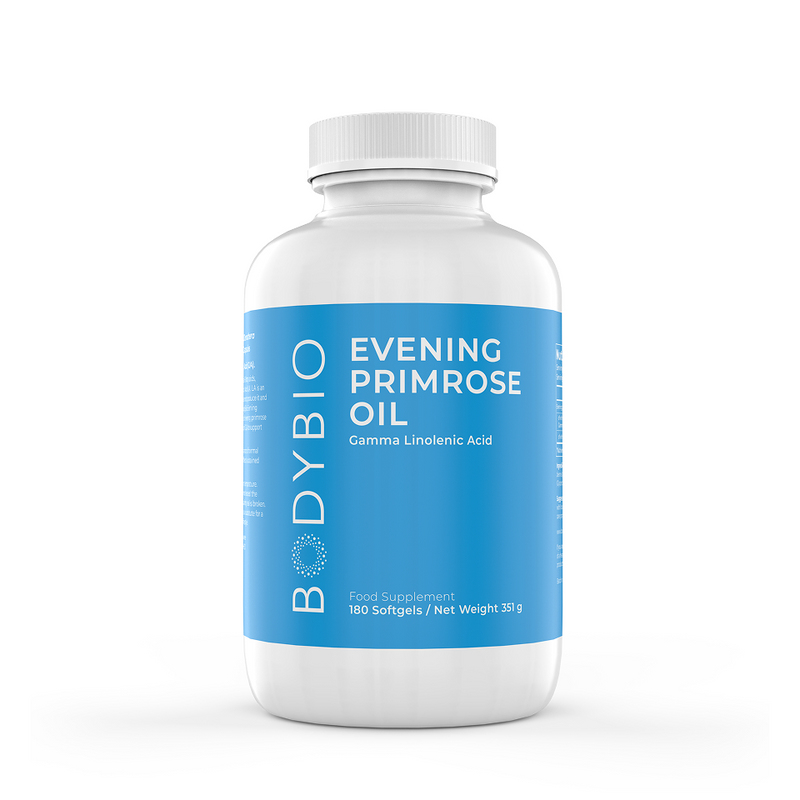Evening Primrose Oil Benefits for Hormone Balance & Cellular Health
Key Takeaways:
Key Points:
- Omega-6 fatty acids have recently gained a bad reputation since most on the market today are heavily processed and inflammatory (i.e., canola oil and vegetable oil). However, it’s important to recognize the benefits of omega-6 fatty acids when used and sourced responsibly.
- A powerful omega-6 fatty acid called gamma-linolenic acid (GLA) is found in evening primrose oil. It’s sourced from a North American native plant and can help with hormone-related symptoms and improve cellular health.
- When using evening primrose supplements, make sure you get them from a trustworthy source. Supplements should be cold-pressed and shouldn’t contain any borage oil.
While influencers are spreading fear about seed oils, we’ve made it our mission to educate about the benefits of omega-6 fatty acids — and why they’re essential to our cellular health.
Seed oils have a bad reputation because they’re heavily processed. Vegetable oil and canola oil are chemically manipulated and heated until they become inflammatory. Unfortunately, these oils have become such a staple in modern foods that they’re interrupting our body’s careful balance of fatty acids (the goal is a 4:1 ratio of omega-6 to omega-3).
While this should urge us to eat fewer processed foods and eliminate inflammatory oils, the goal shouldn’t be to remove omega-6 fatty acids altogether. Instead, we need to better understand these fatty acids and harness their cellular benefits.
One of our favorite healthy sources of omega-6 fatty acids is evening primrose oil. Rich in gamma-linolenic acid, it’s a well-loved remedy for hormone balancing, skin health, and regulating the body’s inflammatory response.*
Table of Contents:
- What Is Evening Primrose Oil?
- Evening Primrose Oil Benefits
- How to Use Evening Primrose Oil
- Get the Right Omega-6s for Your Cells with Evening Primrose Oil
What Is Evening Primrose Oil?
Evening primrose oil comes from a North American plant of the same name. The oil is harvested from the plant’s seeds and is well-known for its gamma-linolenic acid content, which is a powerful anti-inflammatory omega-6 fatty acid.
The History of Evening Primrose Oil
Historically, the evening primrose plant was used by Native Americans for skin care and wound healing. It may have also been ingested for ailments like stomach inflammation and gut dysbiosis, too. Today, it’s primarily used in the form of dietary supplements, promoting better cellular health by providing the body with nourishing omega-6 fatty acids.
Source of Omega-6 Fatty Acids
Removing omega-6 fatty acids from our diets altogether is a slippery slope — since they’re required for cellular function. In a perfect world, omega-6 fatty acids are designed to support bone density, skin health, hormonal balance, and metabolism.
That said, highly processed foods are filling us with an unhealthy version of omega-6 fatty acids — usually rancid, inflammatory, and processed oils extracted with chemicals. High levels of these oils in our diet are offsetting our body’s delicate balance of omega-6 to omega-3 fatty acids (the ideal ratio is 4:1).
It’s essential that we pay attention to both the 4:1 fatty acid ratio and find healthier options to replace inflammatory omega-6 fatty acids. When extracted correctly, evening primrose oil should be considered a powerful source of healthy omega-6 fatty acids.
Evening Primrose Oil Benefits
Even if you’re avoiding foods with highly processed trans fats, we need healthy seed oils like evening primrose now more than ever. Evening primrose oil is a traditional food packed with nutrients. Here are just a few of its benefits.
| Benefit | How It Helps |
|---|---|
| Boosts Cellular Health | Regulates the inflammatory response; supports a healthy cell danger response (CDR) |
| Balances Hormone Health | Supports hormone balance, eases PMS and menopause symptoms, and aids fertility (when appropriate) |
| Improves Skin Health | Reduces redness and acne; boosts skin hydration, elasticity, and collagen production |
| Manages Pain and Inflammation | May help reduce nerve pain (neuropathy) and inflammatory-driven chronic pain and joint swelling |
A Boost to Cellular Health
The presence of linoleic acid and gamma-linolenic acid speaks to evening primrose oil’s ability to regulate the inflammatory response in the body.* This is particularly helpful for calming and sustaining a healthy cell danger response (CDR).
If our cell danger response is out of whack, it can leave us with chronic illness, mitochondrial dysfunction, and chronic stress — where our cells struggle to communicate with each other. Combined with other mitochondria-boosting methods, the nutrients in evening primrose oil can offer a powerful boost to your cells.
Balance Hormone Health and Aid Fertility
If you regularly suffer from symptoms of premenstrual syndrome (PMS), menopause, or hormone imbalance, evening primrose oil may be able to help. The omega-6 fatty acid in evening primrose oil is metabolized into prostaglandins, metabolites that help to balance hormones naturally. One study shows that it’s an effective natural remedy against hot flashes and helps to improve social activities, sexuality, and libido in menopausal women.
The only time you may want to avoid evening primrose oil is during early pregnancy. It’s known to soften the cervix, which can promote preterm labor. This is helpful if you’re ready to give birth, but should be avoided otherwise.
Improve Skin Health
The omega-6 fatty acids in evening primrose oil not only help to regulate the inflammatory response (think: less redness and acne) but can also help us build better skin structure. Sebum (a protective oily coating on our skin) naturally contains linoleic acid — which keeps the skin hydrated and promotes elasticity. Orally and topically, evening primrose oil can help increase collagen production, too.
Manage Pain and Inflammation
Studies have shown promising effects when using linolenic acid to treat neuropathy and nerve pain — particularly in patients with diabetes. Due to its ability to regulate the inflammatory response, evening primrose oil may also help with inflammatory-driven chronic pain and joint swelling.
How to Use Evening Primrose Oil
While you can use evening primrose oil topically, we recommend getting it through responsible supplementation. High-quality oil should be cold-pressed in order to retain all the nutritional benefits and not cut with borage oil (since borage oil contains significantly less GLA and is often chemically extracted).
You’ll want to take a daily dose of evening primrose oil for three to six months to experience the full benefits. We also recommend pairing it with a diet of whole foods and perhaps our Balance Oil to ensure omega-3 and omega-6 ratios stay in check.
As you add more healthy fats to your diet, look at this as your opportunity to cut out the highly processed rancid oils. Always check your food labels — these toxic fats tend to hide in plain sight!
Get the Right Omega-6s for Your Cells with Evening Primrose Oil
Eliminating food triggers and highly processed foods can be helpful, but this is just the first step — and we need to consider the bigger problem, a lack of true healthy fats. Omega-6 fatty acids and evening primrose oil are good examples of this. They currently have a bad reputation, but they’re powerful resources for your health when sourced and used responsibly.
We formulated our Evening Primrose Oil to be the highest quality on the market — an unadulterated source of pure essential fatty acids that help you target hormone imbalance, inflammation, and metabolic issues without worrying about added toxins due to poor extraction techniques.
Mahboubi M. (2019). Evening Primrose (Oenothera biennis) Oil in Management of Female Ailments. Journal of menopausal medicine, 25(2), 74–82. https://doi.org/10.6118/jmm.18190
Timoszuk, M., Bielawska, K., & Skrzydlewska, E. (2018). Evening Primrose (Oenothera biennis) Biological Activity Dependent on Chemical Composition. Antioxidants (Basel, Switzerland), 7(8), 108. https://doi.org/10.3390/antiox7080108
Jamal, G. A., & Carmichael, H. (1990). The effect of gamma-linolenic acid on human diabetic peripheral neuropathy: a double-blind placebo-controlled trial. Diabetic medicine : a journal of the British Diabetic Association, 7(4), 319–323. https://doi.org/10.1111/j.1464-5491.1990.tb01397.x







